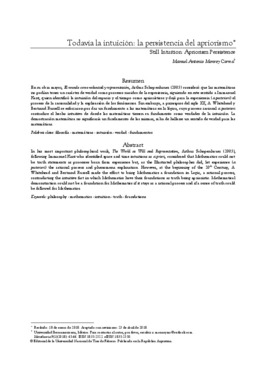Todavía la intuición : la persistencia del apriorismo
Still intuition : apriorism persistence

Ver/
Fecha
2018-10-01Autor
Monroy Correa, Manuel AntonioResumen
En su obra mayor, El mundo como voluntad y representación, Arthur Schopenhauer (2005) consideró que las matemáticas no podían tener un carácter de verdad como procesos nacidos de la experiencia, siguiendo en este sentido a Immanuel Kant, quien identificó la intuición del espacio y el tiempo como apriorísticos y dejó para la experiencia (a posteriori) el proceso de la racionalidad y la explicación de los fenómenos. Sin embargo, a principios del siglo XX, A. Whitehead y Bertrand Russell se esforzaron por dar un fundamento a las matemáticas en la lógica, cuyo proceso racional a posteriori contradice el hecho intuitivo de donde las matemáticas tienen su fundamento como verdades de la intuición. La demostración matemática no significaría un fundamento de las mismas, si ha de hallarse un sentido de verdad para las matemáticas. In his most important philosophical work, The World as Will and Representation, Arthur Schopenhauer (2005), following Immanuel Kant who identified space and time intuitions as a priori, considered that Mathematics could not be truth statements as processes born from experience but, as the Illustrated philosopher did, let experience (a posteriori) the rational process and phenomena explanation. However, at the beginning of the 20th Century, A. Whitehead and Bertrand Russell made the effort to bring Mathematics a foundation in Logic, a rational process, contradicting the intuitive fact in which Mathematics have their foundations as truth being aprioristic. Mathematical demonstration could not be a foundation for Mathematics if it stays as a rational process and if a sense of truth could be followed for Mathematics.
